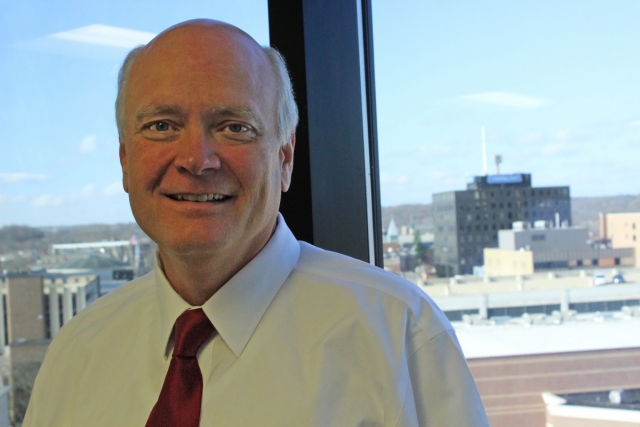
Since the day he stepped foot in Kalamazoo as the founding dean of Western Michigan University Homer Stryker M.D. School of Medicine, the Kalamazoo community’s support for the medical school has been palpable for Dr. Hal B. Jenson.
His first day on the job — March 22, 2011 — was the same day of the announcement of a $100 million cash gift to WMU that served as the foundation funding for WMed.
Less than nine months later, he was there when the 330,000 square-foot building that became WMed’s W.E. Upjohn M.D. Campus in downtown Kalamazoo was donated by MPI Research. The announcement was made by William U. Parfet, who was chair and chief executive officer of MPI Research, and the great-grandson of W.E. Upjohn.
“It is very gratifying to feel the support of the community for this medical school, but more importantly, to feel the support of people who live in this area to support and improve the communities we live in,” Dr. Jenson said. “That kind of commitment to the community was important in me deciding to come here.”
Dr. Jenson says there’s no denying the “incredible philanthropy” that has made the medical school possible, but the community’s investment in WMed and its mission has come in other ways, as well.
He said he has witnessed that commitment from faculty and staff at WMed, as well as from Borgess Health and Bronson Healthcare and doctors at both hospitals. Over 500 physicians from the community have become faculty at the medical school and committed their time and energy to help educate the next generation of physicians.
“We see community commitment in patients who are willing to allow students to be a part of providing their care,” Dr. Jenson said. “We see it in our standardized patient program where we have had a very good response from people who are willing to come and be standardized patients (in WMed’s Simulation Center) to help train our medical students.”
With all of that in mind – the community’s commitment, its generosity, its investment in WMed – Dr. Jenson said he is grateful.
“The medical school would not be here without the support of the community,” he said.
Dr. Jenson came to WMed following a six-year stint as Chief Academic Officer of Baystate Medical Center and Regional Dean of the western campus of Tufts University School of Medicine, in Springfield, Massachusetts. He said recently he didn’t know much about Kalamazoo before moving to Michigan, but was aware of philanthropic efforts in the community, including The Kalamazoo Promise. “I thought what an incredible place,” he said, “that the community would make such a commitment to its youth.”
“Kalamazoo has turned out to be just that kind of incredible place with a commitment to the future,” he said. “… Community leadership, civic leadership and community organizations are very important for our communities to move forward and that is something that exists in Kalamazoo and benefits all of us.”
The community is a key fourth collaborator with the medical school along with Borgess, Bronson and WMU, Dr. Jenson said. In turn, WMed is committed to ensuring that the institution as well as its students, residents, faculty, and staff, are engaged in improving the health of the community and other communities it serves.
Dr. Jenson said the community has played an important role in the development of the medical school’s curriculum for MD students. During their first two years of medical school, WMed students take part in Active Citizenship, which allows them the opportunity to work directly with groups and organizations on projects that identify and aim to solve problems in the community.
“We don’t live in a silo, we live in the community,” Dr. Jenson said. “I think we are very much community-engaged. That’s an important aspect for any medical school for the future because our physicians have to be engaged in the communities they work in.”
“We want our students to have the tools they need to be engaged during their careers as physicians.”
In addition to the work being done at the medical school, Dr. Jenson and his family have also become involved in the Kalamazoo area since moving here in five years ago.
Dr. Jenson currently serves on the Board of Directors of the Kalamazoo Symphony Orchestra, as well as the Youth Advancement Academy, which seeks to provide at-risk students with an alternate route to a high school diploma through the Kalamazoo Regional Educational Service Agency (KRESA).
Additionally, Dr. Jenson and his wife, Polly, are active in the Kalamazoo community through their church, and Polly serves on the Board of Directors at the Kalamazoo Institute of Arts. The couple also previously was involved in activities with Portage Central High School with their daughter, who was a swimmer and a member of the school’s forensics team before her graduation in 2014.
“Medicine is about serving so it’s just part of the nature of being a physician and it’s part of giving back to the community,” Dr. Jenson said of his efforts outside of WMed. “I am blessed to have been able to have the life I have had and even though it’s been a lot of work I’ve still been very blessed to be where I am. I want to give back to help others have a good life, as well.
“A lot of that happens inside the walls of a medical school, but there’s a lot that happens outside of the walls of a medical school too.”
As WMed grows, Dr. Jenson said the relationship between the institution and the community will continue to be key to ensuring the medical school’s continued success.
“We have had a lot of support from across the community and we’re still working toward our goal to develop a sufficient endowment for the medical school so we ensure that it’s sustainable in perpetuity,” Dr. Jenson said. “We still have a way to go. We’re not done yet … and we know that goal is achievable.”
